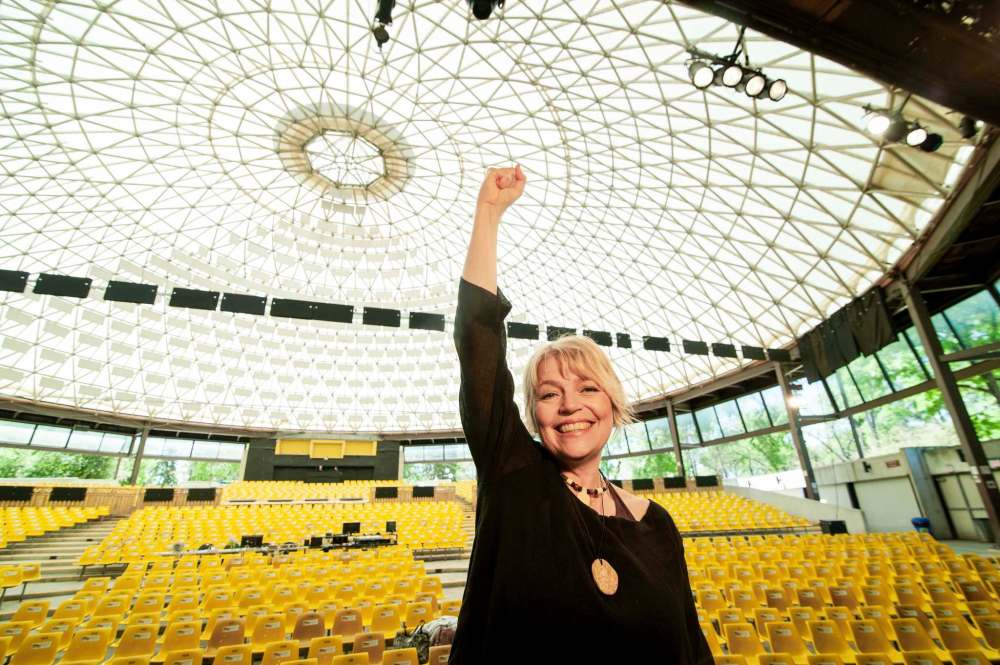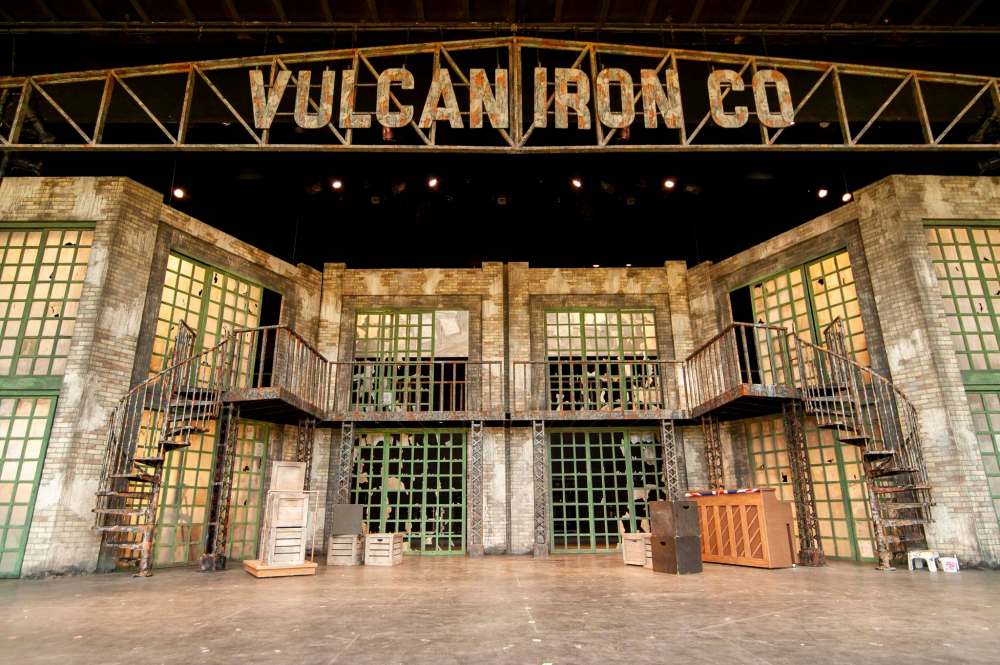Striking resemblance Revamped musical features same story arc, new characters, songs
Read this article for free:
or
Already have an account? Log in here »
To continue reading, please subscribe:
Monthly Digital Subscription
$0 for the first 4 weeks*
- Enjoy unlimited reading on winnipegfreepress.com
- Read the E-Edition, our digital replica newspaper
- Access News Break, our award-winning app
- Play interactive puzzles
*No charge for 4 weeks then price increases to the regular rate of $19.00 plus GST every four weeks. Offer available to new and qualified returning subscribers only. Cancel any time.
Monthly Digital Subscription
$4.75/week*
- Enjoy unlimited reading on winnipegfreepress.com
- Read the E-Edition, our digital replica newspaper
- Access News Break, our award-winning app
- Play interactive puzzles
*Billed as $19 plus GST every four weeks. Cancel any time.
To continue reading, please subscribe:
Add Free Press access to your Brandon Sun subscription for only an additional
$1 for the first 4 weeks*
*Your next subscription payment will increase by $1.00 and you will be charged $16.99 plus GST for four weeks. After four weeks, your payment will increase to $23.99 plus GST every four weeks.
Read unlimited articles for free today:
or
Already have an account? Log in here »
Hey there, time traveller!
This article was published 15/06/2019 (2366 days ago), so information in it may no longer be current.
Strike! The Musical, a historical drama based on the events of the Winnipeg General Strike in 1919, has been produced a few times in the city since it was first workshopped at the University of Winnipeg in 2003.
Theatre preview
Strike! The Musical
● By Danny Schur and Rick Chafe
● Rainbow Stage
● June 18 to July 5
Tickets $25-$65 at rainbowstage.ca or 204-989-0888
But unless you’ve been one of the chosen few to see the movie Stand!, an upcoming film based on the original play by Danny Schur and Rick Chafe, you’ve never before seen the version of Strike! set to première next week at Rainbow Stage.
That’s because this new production incorporates elements of the film, including new characters, new songs and new dynamics.
“It’s a complete cross-pollinization,” Schur says during a rehearsal break at the Kildonan Park domed theatre. “Rick is calling it a new play. The story arc is the same, but so much of it is different.
“Rick and I have had the extraordinary luxury of getting to rewrite it over and over and over, we hope, for the better,” Schur says, adding the film’s director, Robert Adetuyi, influenced them to make it more diverse in terms of characters and casting.

“Also, much about the movie was reacting to current politics,” Schur says, referring to a current surge in the type of nativism, anti-immigrant sentiment, economic inequality and outright racism that also fuelled the Winnipeg General Strike.
The metaphor is the message
By Danny Schur
I am a Winnipeg composer/producer/writer for stage, screen and studio. I have spent the better part of the past 15 years alongside my co-writer Rick Chafe, adapting our stage musical Strike! (set against the 1919 Winnipeg General Strike) into many alternate versions — radio play, small-cast stage version, movie adaptation. The project is living proof that musicals are never written, just rewritten! As I write this, I am working on the newest iteration of the stage musical script for Rainbow Stage.
Suffice to say, Rick and I have done an awful lot of research into the 1919 general strike. We can quote the historical minutiae of the event in surprising detail. But our fascination is less with the historical record and more with the contemporary resonance of the story.
By Danny Schur
I am a Winnipeg composer/producer/writer for stage, screen and studio. I have spent the better part of the past 15 years alongside my co-writer Rick Chafe, adapting our stage musical Strike! (set against the 1919 Winnipeg General Strike) into many alternate versions — radio play, small-cast stage version, movie adaptation. The project is living proof that musicals are never written, just rewritten! As I write this, I am working on the newest iteration of the stage musical script for Rainbow Stage.
Suffice to say, Rick and I have done an awful lot of research into the 1919 general strike. We can quote the historical minutiae of the event in surprising detail. But our fascination is less with the historical record and more with the contemporary resonance of the story.
I always say that you don’t write period pieces just to put actors in fancy costumes. You write them because the period has something to say about today. And although the Winnipeg General Strike took place 100 years ago, there are universal themes that make the strike a parable for the present. For the artist, the metaphor is the message.
In this era of stagnant wages and declining middle class, we recognize that most universal theme of economic uncertainty. In the spring of 1919, the rate of inflation topped out at 80 per cent, due to massive postwar inflation. Little wonder labour was fighting so strenuously for a living wage, a struggle that continues today in countless places and myriad ways.
Imminent threat
Suspicion and fear were rampant in the period immediately after the Great War. The ruling classes were convinced that the Russian Revolution was an imminent threat to Canadian democracy. Winnipeg’s upper class felt as justified in strong-arm leadership as those who support far-right populism today.
The opponents of the general strike were quick to paint the strike as an “incipient revolution” led by “enemy alien” foreigners — a 1919 fake news story used to cunning effect. (The strike leaders were all Brits.) Cue today’s headlines about wall-building, immigrant scapegoating and air travel bans for evidence of our ugly tendency to nativism. Blaming the “other” is an age-old ploy.
Women like Helen Armstrong had important roles during the strike and fought for a voice at a table composed overwhelmingly of men. The gender pay gap was even more extreme in 1919 than today. That there still is a gender wage disparity in 2019 is surely stirring Armstrong in her grave. The #MeToo movement is proof positive that the quest for women’s rights is nowhere near its end.
Winnipeg had a growing black community in 1919, many of whom took part in the general strike. Métis and Indigenous soldiers fought with distinction in the Great War, only to return to a Canada unwilling to acknowledge their contribution. Métis and Indigenous veterans were deprived of the benefits of the Soldier Settlement Act; the black community was subjected to a ban on further immigration to Canada. Although the world might see Canada as a non-racist utopia, the #BlackLivesMatter and Truth and Reconciliation movements are shedding lights on systemic racism with deep roots.
Scrappy, idealistic solidarity
Of the 30,000 or so workers who participated in the general strike, upwards of two-thirds were not unionized. That is a surprisingly high number, considering that a large percentage of the non-unionized strikers were unskilled immigrant labour for whom walking off the job was a high-stakes proposition. But this kind of scrappy, idealistic solidarity is a defining characteristic of Winnipeg. Today’s equivalent is seen in the general public demonstrating alongside educators in Los Angeles or Toronto. Idealism never dies.
Tribalism was a defining ethic of the class-conscious Edwardian world. One knew one’s place and did not stray from it. But despite the end of the class system, our all-too-human tendency to retreat to the confines of an us-against-them partisanship remains. Polarization is once again in fashion and tolerance is in retreat. The general strike reminds us that, in the absence of compromise, the real consequence of societal discord is violence. Conciliation is a worthy endeavour.
But there is an overriding theme of the general strike that causes my Winnipeg heart to beat more proudly, and which was my original impetus for the musical: the inspirational notion of standing up for human rights. The general strike provides many examples, but perhaps the most inspiring was when veterans crossed lines of ethnicity and class to stand up for those who were considered the enemy mere months before. Today, Winnipeggers of all stripes recognize that a truly great city is built on a foundation of human rights and dignity for all. This is the “love thy neighbour” Winnipeg to which we imperfectly aspire.
We are the can-do city of the Canadian Museum for Human Rights. To be the “Geneva of the Prairies,” we would do well to explore our human rights stories and present them to the world. One hundred years later, the themes of the 1919 Winnipeg General Strike make for a parable with much to teach the world of today.
Danny Schur is the author, with Rick Chafe, of the musical Strike!, which opens on June 20 at Rainbow Stage. Their movie adaptation, Stand!, opens in theatres this fall.
Hence, while the show still focuses on the tragic story of Mike Sokolowski (who has played the role since the show was first workshopped in 2003), the new iteration of Strike! has new characters, including Emma, a black maid in a wealthy Wellington Crescent household (played by recording artist Maiko Watson Munroe of the Canadian pop band Sugar Jones), and Gabriel, an Indigenous soldier returning from the First World War and confronting the racism of an ungrateful country (played by Rainbow Stage newcomer Nick Nahwegahbow).
“That was Rick (Chafe)’s discovery — of the Métis and Indigenous First World War vets who fought with honour and were completely discriminated against when they came back,” Schur says. “They wouldn’t even let them in the Legions and stuff like that.”
The music has gone through an overhaul, courtesy of musical director Jesse Grandmont, who has added a contemporary sensibility to the original play’s more quaint score.
“I formerly was of the opinion that if it’s a period show, you’ve got to have period music,” Schur says. “I was really influenced by Fiddler on the Roof.”
Again, it was Adetuyi who compelled Schur to re-evaluate his score.
“Robert said, ‘You heard of Hamilton?’” Schur says with a laugh, referring to Lin-Manuel Miranda’s Tony Award-winning Broadway hit. “So we changed the arrangements, so in the stage show now, we have the movie arrangements of the songs and they’re as hip-hop cool as anything you’d hear on the radio.”
Rainbow Stage’s artistic director, Carson Nattrass, chose this new iteration of Strike! for Rainbow’s 2019 season partly to fulfil a promise to stage more Canadian works at the venerable West Kildonan venue, a promise he managed to deliver in his first year.
“This is the first locally penned book musical in our 65-year history,” Nattrass says. (The 2005 première of the musical was performed at Rainbow Stage, but was not technically part of the Rainbow season.)

Nattrass has a long history with the work, playing the role of an Irish immigrant named O’Reilly.
“I’ve been a part of it for 14 years,” Nattrass says. “I was in Danny’s production that was presented here. We did it in May to applause with mittens on hands.”
Nattrass also performed the play on a CBC Radio broadcast, on the Manitoba Theatre for Young People stage in a version produced by Schur, and for good measure, he appears in the film, too.
“I’ve thought a lot about this show,” Nattrass says. “I know the bones of it are good, and the music is fantastic. But we wanted to offer an audience that thinks they’ve seen it before… something they’ve never seen before.”
The job of directing that iteration fell to local actor-playwright-director Sharon Bajer, who also has a history with the show.
“I was in the original production in 2004 as the silent maid,” says Bajer, who is married to Nattrass. “At the end of the run, I said to Danny, ‘She needs a song.’
“But I have approached it as a whole new show,” she says. “We had the benefit of having the play completely re-examined and pulled apart and the scenes enriched.”
As a playwright herself (Burnin’ Love, Molly’s Veil), Bajer affirms Schur’s assertion: “Musicals aren’t written. They’re rewritten.”
“I think I’ve rewritten all my shows based on information you got from the last production,” she says. “It just keeps growing and growing.”
randall.king@freepress.mb.ca
Twitter: @FreepKing


In a way, Randall King was born into the entertainment beat.
Our newsroom depends on a growing audience of readers to power our journalism. If you are not a paid reader, please consider becoming a subscriber.
Our newsroom depends on its audience of readers to power our journalism. Thank you for your support.










